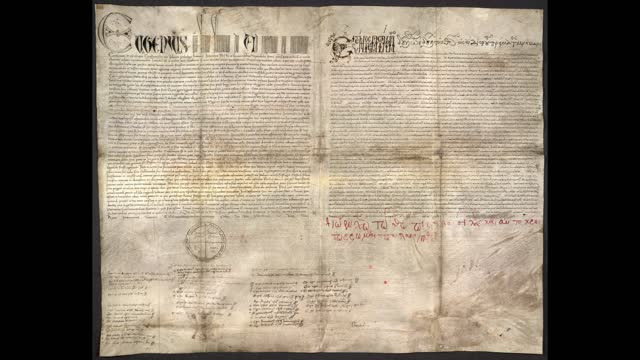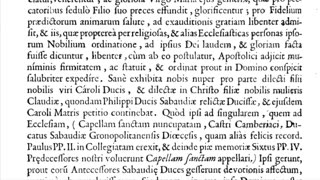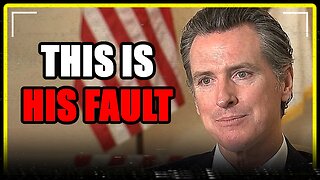Premium Only Content

Laetentur Caeli: Bulla Unionis Graecorum (6. Iul. 1439) per Concilium Florentinum sub Eugenio PP. IV
Laetentur Caeli: Bulla Unionis Graecorum (6. Iul. 1439) per Concilium Florentinum sub Eugenio PP. IV
The Ecumenical Council brought to Florence the Eastern Roman Emperor, the Patriarch of Constantinople, representatives of the Patriarchal Sees of Antioch, Alexandria and Jerusalem, a Greek delegation of 700 people, prelates, doctors of theology, masters and representatives of chapters, monks and clerks of inferior orders. Pope Eugene IV was presiding. The Council was an extraordinary opportunity of exchange between Western Humanists and Byzantine intellectuals. As the debaters at the Council used ancient authorities for their debates, hundreds of Greek codices were brought to Florence and translated. Debates generated fascinating developments in humanism, philosophy and culture. There had been an ongoing dialogue before, but the intense contact during the council brought with it an increase in the exchange of ideas, writings and art. A new interest arose in early writings in Greek. Critical writings from both sides about the mistakes of the other were compared and discussed. A high number of Byzantine artworks made their way into Italy, and icons were venerated in the West.
The discussions turned around central questions of faith which distinguished both churches, such as the origin of the Holy Ghost. They discussed at length their doctrine of the Trinity. The discussions were widely based on the writings of Greek and Latin writers with authority within the churches.
Debates often took place as questions and answer sessions. Sources report cultural differences: while the Latins were of the opinion that discussions should be public, the Emperor preferred private meetings. Also, the technical terms which were used did not always have the same connotations, and this was a source of misunderstanding.
While the Greeks relied more on the authority of old texts, the Latins liked to use the power of argument. In the eyes of one Greek participants:
“The Latins have contended brilliantly for their faith so that no one with a sense of justice has any reason to reproach them... They brought forward from the common Fathers of the Church the six most renowned in dignity, wisdom, and the struggles for the faith as witnesses of their doctrine (...). They argued so precisely and clearly, expressing the question in exact words and as befits teachers (...). Besides, they put forward others from the common Fathers, those of the East I mean, adorned with an equal wisdom and honour who said, they too, just the same as those others, though not so plainly (...).”
A pessimistic view was voiced by Isidore of Kiev, after recapping the arguments of both sides: “I say with regret that they have rather deepened the schism and have made the disagreement greater and stronger.”
After weeks of lengthy negotiations, the Greek delegation refused to go any further. The Emperor commented: “We will join no more discussions. Discussion will lead us nowhere. You drown us in words and then claim victory.” He suggested that ten representatives from each side should meet in eight conferences to see if any result could be obtained that way.
Finally, the Latins proposed a text which the Greeks found acceptable. The Emperor then arranged that six from either side should meet to write out the decree of union in both languages ready for the signatures, with the leaden seal of the Pope, and his own gold seal. The decree of union was written and then signed by both parties. It was solemnly proclaimed on Monday, 6 July, a holiday for Florence. After more than 400 years of separation, what was laid down in the decree was now the faith of both churches.
Extract from the “Bull of Union”, at the Council of Florence (XVII Ecumenical), Session 6 — 6 July 1439:
“Eugenius, bishop, servant of the servants of God, for an everlasting record. With the agreement of our most dear son John Palaeologus, illustrious emperor of the Romans, of the deputies of our venerable brothers the patriarchs and of other representatives of the eastern church, to the following.
Let the heavens be glad and let the earth rejoice. For, the wall that divided the western and the eastern church has been removed, peace and harmony have returned, since the corner-stone, Christ, who made both one, has joined both sides with a very strong bond of love and peace, uniting and holding them together in a covenant of everlasting unity. After a long haze of grief and a dark and unlovely gloom of long-enduring strife, the radiance of hoped-for union has illuminated all.”
Subsequently decrees of union with the Armenian and Coptic churches were also approved.
Quotes from Joseph Gill: The Council of Florence. Cambridge 1959.
#CouncilOfFlorence #RomanEmpire #EugeniusIV
Gratias ago tibi Deo per instrumenta de Jove Mauro Cámara pro bono rei publicae.
-
 5:57
5:57
ProVaticanus
7 days agoLiturgia de SS. Sindone D.N. Iesu Christi ex Iulii II bulla Romanus Pontifex decreta (25 Apr. 1506)
28 -
 LIVE
LIVE
Cewpins
4 hours agoSmoke Sesh🔥Gaming???💨420🍃!MJ !giveaway
95 watching -
 LIVE
LIVE
Phyxicx
2 hours agoShin Megami Tensei - Part 5 - 8/13/2025 | Chaos Route | Expert Difficulty
73 watching -
 1:59:32
1:59:32
vivafrei
13 hours agoEp. 277: Russia Peace Talks! Trump D.C. Takeover Leads to Lawsuit! Heat Wave Lawsuit? AND MORE!
71.1K75 -
 2:17:57
2:17:57
Nerdrotic
4 hours ago $4.28 earnedTransient Lunar Phenomenon: Deeper into the Mysteries of the Moon | Forbidden Frontier #112
20.3K2 -
 2:58:44
2:58:44
Barry Cunningham
1 day agoBREAKING NEWS: PRESIDENT TRUMP ABSOLUTELY TROLLS THE MEDIA! BIG WEEK AHEAD!
70.3K95 -
 1:37:28
1:37:28
Sarah Westall
5 hours agoReal Intel: Power Struggles Fueled by Blackmail, Surveillance & Coercion w/ Dr. Dave Janda
38K35 -
 9:49
9:49
MattMorseTV
7 hours ago $12.58 earnedNewsom's CAREER just WENT UP IN FLAMES.
32.6K72 -
 LIVE
LIVE
Spartan
5 hours agoHalo for a bit, Octopath after maybe
91 watching -
 3:49:55
3:49:55
sophiesnazz
6 hours ago $2.43 earned6kd in these lobbies !socials !specs
31.2K2